Book Reviews by Genre: Science Fiction
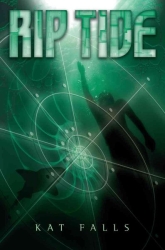
Really good book! Ty loves to swim in the ocean, but he knows that dangerous things lurk under the surface. He comes from a subsea farm, and he’s ready to face anything. Except an entire underwater township that’s connected to a sunken airplane. It’s a clue in a mystery that has killed hundreds of people, and threatens to claim his and his friend, Gemma. Ty and Gemma are in a race for their lives, and have to deal with outlaws, officers and other dangerous people. Can Ty and Gemma save everyone in time?
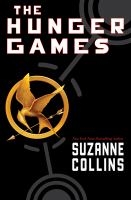
Katniss lives in an unfair society; the poor and unfortunate people are famished and weak and must work for the rich to supply them of all their needs. Every part of the country was split into districts apart from the Capitol, where the rich people resided. Each district had a job and must also supply two random tributes to the Capitol for the annual hunger games. The hunger games started after the districts were made because of a large uprising that caused a war amongst the districts and the capitol. The hunger games was a competition made for the Capitols enjoyment to get a message to the districts. The two tributes from each district would have to fight to the death with the other districts in a large arena until only one survivor remained. Unfortunately, at the reaping (where they pick the tributes) Katniss’ sister was called, what with Katniss do, will she be able to help?
The Hunger Games by Suzanne Collins is an amazing novel. The book is incredibly thrilling and keeps you on your toes. However, even though it is very action packed it also makes you think, and the book is filled with a rich history and thought-out lore. Each character is unique and has different insights and opinions regarding the place they live in. I believe that Suzanne Collins' The Hunger Games is a perfect dystopian novel and highly recommend it to anyone who wants to read it.
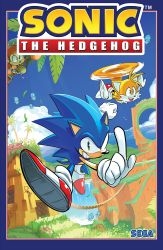
Are you a fan of Sonic The Hedgehog and all his awesome friends? Do you like high-speed action adventures? Are you just looking for a good comic book to read while you kick back with an afternoon chili dog? If so, then this is the perfect book for you! The amazing first installment in this action-packed series, writer Ian Flynn wows his readers with the latest escapades of the Blue Blur himself! Set after the story of the new Nintendo Switch release Sonic Forces, the collection follows Sonic as he races around the world following the war with his arch-nemesis Dr. Eggman, who has seemingly disappeared. However, his maniacal machines are still a threat to Green Hill, and Sonic, with his best friends Tails, Amy, and Knuckles, along side Princess Blaze, all must shut them down. Can Sonic solve the mystery that presents itself as events unfold? Featuring pages of magnificent cover art and the debut of a brand new character, this super-powered comic is guaranteed to be a smash hit!
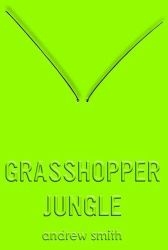
This book was weird.
It felt like a windstorm of ideas blowing in my face; a mad prophet's ravings before catastrophe, and a tangled mess of actions and consequences - but somehow they all connected together? It was a bit of an experience.
Grasshopper Jungle is a story about the end of the world, but like many teen novels, it is simply a backdrop to Austin's personal dramas. One of its tags on Libby is "humor" but I think it's more of a tragedy if anything. The main character and his best friend inadvertently bring about an apocalypse by way of 6-foot tall, ravenous grasshoppers after accidentally breaking a jar they really shouldn't have broken.
The book weaves together the stories of Austin, his childhood experiences, as well as those of his brother, Polish ancestor, the mutant grasshoppers, and random strangers around town (such as his principal, his friend's mom's boyfriend, and a vulgar policeman being memorable ones). It's a lot.
I found this story's distinctive style very difficult to tear myself away from. It was authentic to the protagonist's personality, and it reminded me of the narration of classic epics. It stands out in its themes of memory, religious trauma, sexuality, and identity (and somehow being an apocalyptic story as well). The symbolism was uncanny, and the way the outside world and past timelines mirrored Austin's mental state was very artistic and unique.
Onto my criticisms and confusions: #1 has to be the male characters. I think that every single male character in this story thinks constantly about every other character in a grossly objectifying way. Honestly though, this applies to most of the female characters as well, who are just as lustfully self-interested. Very interesting, but it was a... strange experience to read the nuanced and morally grey portrayal of Austin's ancestor, a gay man who had not-consensual relations with a woman to see if he could "love" anyone other than his dead Communist lover.
Austin himself relates to this ancestor because he, too, is "confused". His gay best friend Robby continually makes advances on Austin, and Austin reciprocates because he is completely in love with Robby. He is also in love with his girlfriend, who doesn't take too kindly to the fact that Austin has kissed Robby during their relationship. Austin even documents the POV of the murderous, bi-curious, mutant grasshoppers.
The ending was extremely abrupt. I'll admit, I was glued to this book for the last quarter, and the ending made me stand up and think "what in the world did I just read". However, in all honesty, it very much suited the style of the book. It never deviates from being a chronicle of the end of the world, and the world around Austin certainly comes crashing down.
Grasshopper Jungle is a weird book that made me think, and I don't regret reading it. It is quite graphic, but if you're interested in this swarm of a book, I highly recommend reading it and forming your own opinion. I might read the sequel, but I'm a bit afraid of what it might hold.
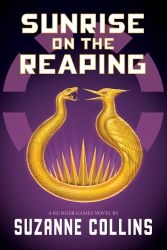
I am in shock from reading this book. So many questions from both the original trilogy and The Ballad of Songbirds and Snakes were answered. I saw an analogy, where the original trilogy are the middle pieces of a puzzle, The Ballad of Songbirds and Snakes is the corners and Sunrise on the Reaping is the edges. I could not agree more, the way they are all perfectly balanced on each other and with Sunrise on the Reaping, Collins paints a whole new picture that really makes you question the whole series.
This book follows Haymitch Abernathy and his story with the 50th Hunger Games. The writing style changes and reflects with each character in the different books, being able to see Haymitch's thoughts and the things that happen which gives a better insight into why he acted in the original trilogy. I loved this book and it is five stars without a doubt.
Reviewer Grade: 11

I am in shock from reading this book. So many questions from both the original triology and The Ballad of Songbirds and Snakes were answered. I saw an analogy, where the original trilogy are the middle pieces of a puzzle, The Ballad of Songbirds and Snakes is the corners and Sunrise on the Reaping is the edges. I could not agree more, the way they are all perfectly balanced on eachother and with Sunrise on the Reaping, Collins paints a whole new picture that really makes you question the whole series.
This book follows Haymitch Abernathy and his story with the 50th Hunger Games. The writing style changes and reflects with each character in the different books, being able to see Haymitch's thoughts and the things that happen which gives a better insight into why he acted in the original trilogy. I loved this book and is five starts without a doubt.

I really enjoyed reading this book! Mary Shelley's 'Frankenstein' is a classic novel that everyone knows. It's a tale about Victor Frankenstein, a scientist, and how he creates life. Except it's made from body parts. What I liked about reading this is that this is the original. Young readers don't really know about all the other complex parts of the story. It was so interesting to read and learn about a narrative I never knew before. More on the plot, it's about how Victor creates a creature and then the seemingly endless and terrifying consequences.
However, this book is incredibly hard to read. The old way it's written makes it easier to get lost or not completely understand what happened. There's a lot of words I had to look up, but the context also helps decipher it. One of my favorite parts of the book is the building suspense. Ultimately, I think this book has so much beauty, because of all the emotions I had while reading it and the message it carries about human nature.
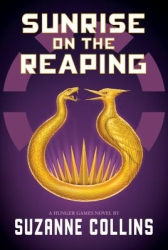
Sunrise on the Reaping follows Haymitch Abernathy and his experience in the Hunger Games, a reality TV show where kids must fight to the death. However, this specific round of Hunger Games has a special twist from the traditional Hunger Games. Due to this Hunger Games being the 50th annual Hunger Games, (also known as the second "Quarter Quell"), Haymitch must face twice as many opponents in his battle of survival.
I finished this book in two days! Even though Sunrise on the Reaping is a prequel and I already knew the outcome, Suzanne Collins still found ways to make the book compelling and interesting, with twists and turns that made this story completely unique. The story was not as predictable as I assumed it to be, which made for a very fun read!
Despite Sunrise on the Reaping being part of the overall Hunger Games series, you could read it as a stand alone without the other books in the series and still enjoy it. There are no dull moments, even from the very first page Collins is able to draw the reader into the world and keep the reader there until the very last page.
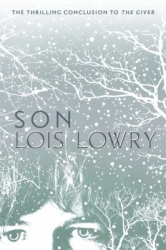
For those who want a story that is nothing short of enlightening, Lois Lowry’s “Son” is the book for you. The fourth and final book in the eye-opening “The Giver” series, the storylines of all the previous books are masterfully and artistically woven into a single thread. Claire, a Birthmother in her community, has her world turned upside down when her baby is taken from her. Now, she must embark on the journey of a lifetime to get him back — no matter what the price. In my humble opinion, this is one of the most fantastic books I have ever read. Being the last book in the series, it has the ability to cultivate an incredibly powerful and complex story that keeps readers heartstrings tied to the page. It’s got plot twists, evil and mysterious villains, amazing shows of strength, moments of joy, sadness, fear, and surprise, all while carrying one warm, loving message. If “Messenger” left you wanting for more, read “Son”. Trust me — it’s worth it.

Once already addicted to the previous two books of this series, the final book of the trio was a must have! Darth Bane: Dynasty of Evil keeps the readers on the edge of their seats! Bane has finally finished training his apprentice, Darth Zannah, in the ways of the Dark Side; However, she seems unwilling to take the title of master for her own. Bane must decide whether to wait longer for Zannah to overthrow him, or he much quickly choose a new apprentice. Which will he choose? Darth Bane, Dynasty of Evil is a perfect book for Star Wars fans, and is an epic ending to the Darth Bane Trilogy.
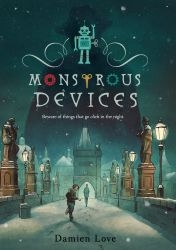
Before receiving what might have been the strangest gift ever, 12-year-old robot enthusiast Alex's life was already plagued enough with bullies and homework. But when he receives a toy robot from his enigmatic grandfather, along with a note that reads "This one is special," a sequence of supernatural events sets off around Alex, and right before things take a deadly turn, Alex's grandfather appears just in time to save his life...and pack him away in an impromptu snowy trip across Europe. As the two begin to unravel the mysteries behind the robot's magic, Alex finds himself becoming the main target of a group of mysterious assassins who follow his every move in the hopes of possessing his robot, and he is forced to battle villains of both human and robot form as he grapples with the immense, monstrous powers of his seemingly innocent toy.
Monstrous Devices is whimsical and unique, and although it is for middle-school aged children, the author is not afraid to add in some chilling, horror-adjacent plot points throughout the story (this novel literally begins with a murder scene...no more on that). While reading this book, I felt as if I was tagging along with Alex and his grandpa as they outwit the assassins; I could hear the robots the assassins used as weapons whizzing and whirring in their deadly attacks, and I could practically see the landscape this book is set in. The bits of history about robots and magic the author added in was also very intriguing, adding a mythical element to the story.
On the other hand, the ending of the book felt somewhat abrupt for me, and there were a lot of questions I had about the characters and the plot that were left unanswered. The lore behind the robot, and even Alex and his grandpa's own backstories, were a little hard to follow, and I ended up somewhat dissatisfied with the lack of conclusions the author gave. The characterizations of the assassins only left more questions, their motives were very unclear, and their eventual fate did not sit quite right with me. I do, however, know that there is a sequel to this book, and I hope that it will tie together some of the unresolved tensions.
In the end, even though it has its flaws, Monstrous Devices remains a magical and entertaining read that young readers will surely enjoy.
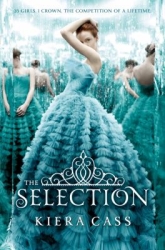
In a distant future, the US has fallen after a devastating sequence of wars, and in its place rises a new nation by the name of Illéa. The country is led by a traditional monarchy, and society is divided into castes, with Ones (royals, elites) lying at the top of the pyramid and the lowly Eights (handicaps, homeless people, orphans etc.) at the bottom, ostracized and left to suffer at the hands of society. As a form of entertainment or tradition, when the King and Queen's male progeny comes of age, the government televises a show known as the Selection, which centers around thirty-five young girls of all different castes compete on national TV for the hand in marriage of the prince.
America Singer is a Five; she's an artist, a singer, like her last name suggests. For her, the prospect of entering in the Selection is nothing but a nightmare, as it threatens her budding relationship with Aspen, who is a caste below her. But after continuous persuasion and bribes from her mother, she decides to compete anyway and finds herself in the presence of Maxon, the young prince of the realm that thirty-four other girls are desperate to win the favor of. Slowly, America begins to fall for him, questioning her own desires.
I had first decided to pick up this book as I thought the concept of a futuristic caste system and a monarchy was very interesting. These types of books were also not ones that I would usually read, so I thought it would be nice to try something different for once. The Selection, for all of its simple and predictable plot structure, is a fairly easy and somewhat entertaining read; I finished the first book in two days! However, that's where the compliments stop. The book overuses too many common YA book tropes (enemies to lovers, love triangles) as well as basic, shallow character archetypes (feisty female main character, dreamy and sweet main love interest, bubbly best friend, superficial mean girls, etc). As mentioned before, the plot has barely any depth, and the mentions of rebel attacks on the royal family and the corrupted caste system seem like a low-quality effort to retain the dystopian aspect of the novel at best. Romance plays itself as the main focus of the novel, and while that is not necessarily bad, it does tend get extremely repetitive as much of the novel and even the whole series centers around America deciding whether or not she really loves Maxon (as well as vice versa). And as for the characters themselves, I found both America and Maxon insufferable and one-dimensional. The book lacks tension and is overall very plain.
I did manage to get through the entirety of the series; however, I do not recommend this book to anyone interested in novels with a blend of romance and dystopian/fantasy elements. There are books out there that execute these genres better than the Selection in my opinion.
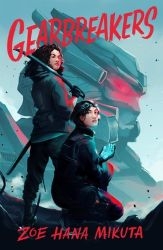
Two queer Asian girls, on different sides of the war. When their paths collide, at first, they are each other's enemy until they both realize they're fighting for the same purpose, and with a tyrannical rule spreading they have to work together to rebel.
This book was amazing, definitely worth reading. This book was full of action, sci fi and romance. This is one of the most underrated books and deserves more recognition.
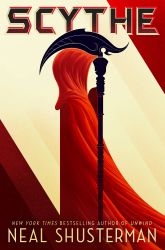
The Thunderhead, an all-knowing artificial intelligence was able to solve all of the world's problems, it could even bring back the newly deceased from the dead. Religion, creativity, hard work, and passion are obsolete, and jobs only exist to give people something to do. Everything is perfect, every accommodation is met, anyone can speak to the Thunderhead, and the Thunderhead can solve anyone's problems. However, because the Thunderhead’s purpose is to help humanity it vowed to have nothing to do with the problem of overpopulation and the humans would have to create that system.
The Scythedom is an organization of people whose job is to glean (or cause the permanent death of an individual). Scythes are treated with the highest honor and have to pay for nothing and wait for no lines, but they carry the tough burden of ending other people’s lives. Every scythe must meet a quota and must follow a list of rules. However, even with great respect no man-made thing is perfect and the drive for power may corrupt the Scythedom.
Citra and Rowan end up as apprentices for a scythe and they will soon learn the guilt and hardship of the job. Only one of them will become a scythe, they must learn and train constantly leaving their old lives behind. Through many plot twists the pair must do what they can to navigate their new environment. How will the other scythes react to a scythe having two apprentices? How will Citra and Rowan change?
Neal Shusterman’s Scythe is an amazing book. It portrays the mental toll and thoughts of the protagonists perfectly and demonstrates their character development amazingly. The world-building is immaculate, and the vocabulary and characters get you immersed in the book quickly. Every detail is looked over and every character is thought out thoroughly, all having unique backstories and different approaches and thoughts to the world around them.
Scythe is also a philosophical masterpiece and touches on subjects like the drive for power and corruption in society. Throughout the book I was thinking constantly and wondering about how the society works. I recommend this book to everybody for its thorough story and how it brings up many deep questions in a unique, subtle, and phenomenal way.
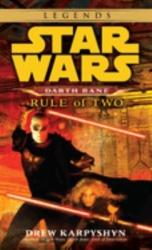
After getting a taste of the raw thrills provided by Drew Karpyshyn’s first novel, Darth Bane: Rule of Two was a must-have! Now having destroyed the Brotherhood of Darkness, Bane must find a suitable apprentice to carry on the power of the Dark Side; His choice: a little girl called Rain who, despite her size, is immensely powerful in the dark side. Bane must struggle to trust his choice of an apprentice, for the future of the Sith relies on it, while Rain must prove that she is worthy of the title of a master. With a similar mix of action as the previous book, this novel also incorporates an integral struggle, making it even more interesting. Darth Bane: Rule of Two will certainly have your hyperdrive engines ready to boost to the third and final book of the series!
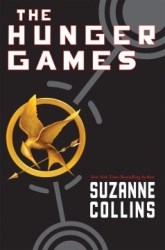
This book is a great young adult novel for anyone who likes the dystopian and fiction genre. In a post-apocalyptic world where everyone is divided into districts, there is an annual competition in which one boy and one girl from each of the twelve districts get picked to fight to the death in a game called "The Hunger Games." The book follows a teenage girl from District Twelve named Katniss Everdeen. The 74th Hunger Games is soon approaching, and when Katniss gets picked to participate her whole world gets flipped upside down. She must work together with her district partner Peeta while using her wits and determination to win the games and return home in victory. I chose to read this book because I think the themes and messages the author tries to convey in her story are interesting and important. I enjoyed the suspense in the book and the in-depth view of the main character's thoughts and emotions. I think this book is important to read and has a lot of interesting messages throughout the story. Although this book may not be for everyone it is certainly a must-read in my opinion.
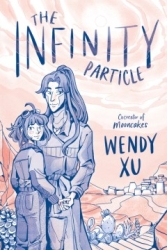
I loved this book so much! It is set in the future, where humanity has expanded and moved to Mars. We follow a girl called Clem, and her robot SENA, who have moved to Mars for an internship with Clem’s idol. While working at the internship, Clem meets a personal build humanoid robot named Kye. Soon, Kye starts to malfunction, and the only one who can help him is Clem. They both have to delve deep into their pasts to solve what’s going on, and they become very close along the way. This book is filled with mystery, romance and secrets hidden in the past. 10/10 recommend!
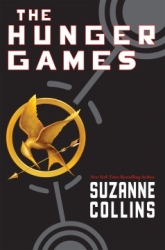
This book had great characters, an amazing plot, and a well thought out structure! The hunger games is a book where every year, two children, a boy and a girl, from each of the 12 districts must go into an arena and fight to the death. The last child standings wins. Katniss Everdeen lives in district 12, the poorest district. When the reaping day comes, she volunteers as tribute instead of her little sister. She gets transported to the capitol, where she is prepared for the games. Once inside the arena, the book takes a many turns, and you’re left in suspense for a while! It was amazing, and a great read. 10/10 recommend.
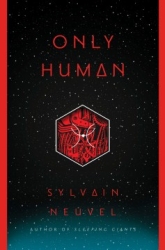
While I was not actively looking forward to finishing this trilogy, I’m glad I finished it for the sense of closure it brought. I still think Sleeping Giants had such an intriguing concept in how it relayed information to the reader, but that you could only really make that work for a single book. With a cliffhanger in each book of the series, I was hoping Only Human would wrap up everything and provide a satisfying conclusion. It certainly did its best to answer all the questions that came up during the previous books, but the ending didn’t particularly wow me.
The difficulty of maintaining a narrative through reports and journal entries is only exacerbated here because the human characters are the only ones who can convey what it is like to live on an alien planet. The jumping back and forth between the past and present was an OK way to hide some of the bigger reveals, but the biggest problem is the snarky nature of most of the characters. I know it’s likely written for laughs, but after a while it becomes tiresome as the events unfold.
In terms of its message, Only Human didn’t feel like it had anything new to say. Introducing the aliens after everything that they put humanity through in Waking Gods felt somewhat anticlimactic as the major action of this book centered on the same old arms race between countries on Earth. Sure, the moral of the story was perhaps clearer here than in the previous books, but probably more as a foot stomp to make sure the readers got the point of the entire series. If I were to recommend the Themis Files again, I’d suggest readers stick to just the first book.
An ending that tied up loose ends but didn’t particularly wow, I give Only Human 3.0 stars out of 5.
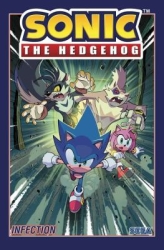
Sonic The Hedgehog Volume 4: Infection is Sonic-speed thrills from cover to cover! Dr. Eggman is gone for good. A happily retired handyman, he’s a threat no longer — or so everyone thought. Now, a new foe has emerged from the shadows and signs are pointing to the return of the doctor’s dark side. As Eggman’s allies slowly increase in numbers, Sonic must rush to find him again. It won’t be easy, though— the devious doctor and his fiendish friends are cooking up a new superweapon that even Sonic and friends can’t contain!!! Combing Ian Flynn’s story writing skills and the art of Adam Bryce Thomas, Diana Skelly, Tracy Yardley and Jack Lawrence, Sonic The Hedgehog Volume 4: Infection is a real treat!
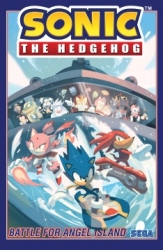
Sonic is back for more way-past-cool adventures in Ian Flynn’s Sonic the Hedgehog Volume 3: Battle For Angel Island! Neo Metal Sonic, the super-powered steel nemesis, has conquered Angel Island and claimed the Master Emerald as his prize. Now, Sonic, alongside Tails, Knuckles, Amy, Shadow, and the rest of the Resistance fighters, must prepare for the fight of their lives in order to prevent Neo Metal Sonic from reviving Dr. Eggman’s terrifying Empire. As the battle goes on, though, Neo Metal Sonic becomes increasingly stronger. Can Sonic stop the robot’s rampage, or will he succumb to the “perfect version” of himself? With awesome art by Tracy Yardley and Evan Stanley, no Sonic fan will be able to resist Sonic the Hedgehog Volume 3: Battle For Angel Island!
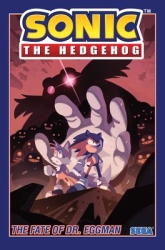
Ready for more exciting adventures? Sonic The Hedgehog Volume 2: The Fate of Dr. Eggman has just that! Since Dr. Eggman’s mysterious disappearance, Sonic has been dashing around the world hunting for him — and whoever is controlling his robot army. But when Sonic, with the help of the Chaotix Detective Agency, finally locates him, he’s in for a big surprise! And that’s not all— Shadow, Sonic’s grim rival, is also hunting for Eggman. While dealing with this problem, Sonic also must uncover the true identity of the Eggman Empire’s new leader. Sonic will have to be at his fastest if the day is going to be saved! Written by Sonic super-enthusiast Ian Flynn and featuring art by Tracy Yardley, Adam Bryce Thomas, and Evan Stanley, along with tons of fantastic cover art, this comic collection is essential for any action lover!
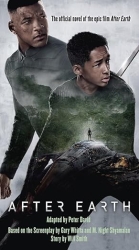
It's weird how a bit of hindsight brings a work into full focus. I never watched the movie After Earth (2013) because of its critical reception among audiences and critics alike. I figured maybe I would give the novel a try, not realizing it was not some work that the movie adapted, but instead a novelization of the movie itself. This was clearly a Will Smith passion project and never have I seen such blatant self-inserts in a work of fiction.
While the author of this novelization may be Peter David, Will Smith was behind much of this plot. Seeing the home life of the adult character in this book mirroring the home life that we know between Will and Jada is cringe-worthy. What's worse is that these characters (either the Will or the Jaden stand-ins) were so flat and boring as to be completely worthless. The plot that drives their adventure felt so juvenile that any group of six-year-olds could think it up playing on a playground. It's almost laughable that there were signs this was meant to be a bigger series.
Ultimately, After Earth is frustrating. It's a mediocre story with lackluster ideas. But, since a rich and famous person wanted to make it, Hollywood and Random House spent a lot of money to get it made. Thinking of all the fantastic (and nearly hidden) indie stories out there that will never get the amount of exposure that this bomb got makes me sad for the entertainment industry. Sure, sometimes there are breakthroughs, but these are rare as the rough edges of interesting works are sanded off to become marketable to the masses.
A nepotism story with no subtlety, I give After Earth 1.0 stars out of 5.
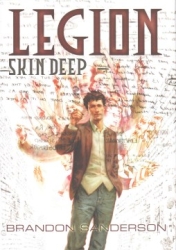
Multiple personalities is one of those tropes that some writers use as a crutch to explain why their main character is so good at a litany of unique skills necessary to move the plot forward. And while the main character in Legion suffers from this superhuman trait, Brandon Sanderson still gives him enough weaknesses so that it's not entirely overpowered. Still, I can appreciate that this concept only took up three novellas (contained in this volume), since it can often overstay its welcome.
Each of the stories revolves around Stephen Leeds, a super-genius investigator who has portioned off his polymath of abilities to different personalities in his head. These personalities take up a physical space around him, even if nobody else can see them. Some of the "rules" around these invisible characters didn't seem to make much sense since they're allegedly all in Stephen's head, but I guess a character like this needs a Kryptonite to prevent him from solving all his problems so easily. I also had to suspend my disbelief with the mysteries Stephen was investigating, mostly rolling my eyes at the unbelievable nature of these concepts.
Overall, though, this trilogy of novellas is a solid read. It's basically a novel in three parts, as I've read full books longer than these three novellas put together. The unique personalities of the "personalities" were all quite entertaining, even if they overshadowed Stephen's somewhat milquetoast characteristics. The engineer in me wanted to know more about how this specific form of multiple personality disorder functioned, since it was a unique take on the disability. At any rate, if you're a fan of Sanderson's work, this is a quick read that proves he knows how to write in short form as well as his standard epic-length books.
An overdone trope that doesn't overstay its welcome, I give Legion 4.0 stars out of 5.
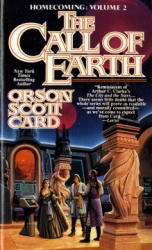
After being so disappointed with The Memory of Earth , I'm surprised I gave the second volume in the Homecoming series a chance. I figured Orson Scott Card could have got things on track by this book, getting rid of all the unnecessary fluff and useless ramblings. Instead, The Call of Earth made it clear to me that I will not be continuing this series. Fool me once, shame on you. Fool me twice, shame on me.
I think part of the problem with this series is how it's written. Having recently read an eye-opening book on identifying "Show versus Tell," it shocked me how much of this book was written with "Tell" language. Granted, a lot of science fiction and fantasy books have to do this to explain interesting magic or technologies. The Call of Earth, however, spent another whole book stuck in this pseudo-Roman society that most people can easily visualize. I'm still convinced he threw this series together to meet a deadline, because it has never felt that inspired.
What's most frustrating is knowing that it could be better. I was expecting this book to be about leaving their planet in search of Earth. Instead, they merely talked about it for 10 hours. None of the characters stood out to me, and whatever plot was there was so forgettable, I don't even care to look up what it was. I get that not every author is going to have all their books be amazing or thought-provoking. But two in a row doesn't give me much hope that the other three books in this series will be any better.
Another disappointing entry in Card's Homecoming series, I give The Call of Earth 2.0 stars out of 5.
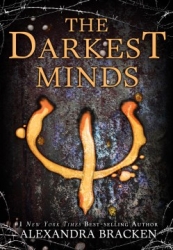
The Darkest Minds focuses solely on our main character, Ruby, a strong-willed, cautious girl who goes through major character growth and development throughout the book. Well, Ruby and the people she meets on her journey of staying alive when the world turns against teens due to a harmful mysterious virus that removed most of the child population. While Ruby did survive, she lost something almost as bad as her life, her parents. After being locked in a garage she was then sent to Thurmond--a brutal government rehabilitation camp of sorts that is far from its title by her own parents. On her journey, looking for stability she runs into Zu, a meek, sweet, and unsettled young girl around her age, presumably around 14. Chubs, the brains of the group and honestly incredibly mature, and finally Liam, a Southern seemingly fearless courageous leader. This memorable group of strong teenagers makes an impact that even they don't know they'll make in this book. I decided to read this book because some years ago when the movie came out I watched it with my brother and I loved it and wished that there was a sequel so I decided to read the entire series because I wanted some closure and I did not regret it.
What did you like about the book? I loved the well-written tight-knit teen relationships and slow-burn romance in this book. The personalities are pretty believable for the characters and I genuinely enjoyed the dialogue and internal thoughts that were portrayed.
There is a lot I like in this book, however of course there are some things I didn't like so much. For example, some events in the book feel a bit dragged out and some others are too short for the emotional weight of some situations that occur. Meaning they could use more explanation or information on the gravity of the event on people around them. If you're thinking "Hm, should I read this book? I would definitely say you should. I thought that this book was a nice read, especially on a day when It's raining and maybe it's later in the day. However, there are some situations that Ruby finds herself In that contain sensitive topics and I'd certainly recommend looking deeper into that on maybe a parental guidance website or another website of that sort if you have a sensitivity or trauma with that kind of thing that I will fail to mention in this review. Overall, The Darkest Minds Is a good read if you want a dystopian teen book with some romantic elements and combat elements. It reminds me of Divergent a bit however it is definitely its own thing and it has its sad moments but it is something you'd have to read on your own to really understand what it is like. When you start reading, you just can't put the book down at a certain point so it keeps your attention. Sometimes I wish I could read this book for the first time again, so make the most of it!
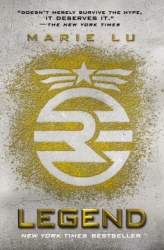
What was once known as the western half of the United States, is now known as a separate country called the republic, a plague-infested land at war with its eastern neighbors, the colonies. This book is an action filled adventure, going through the first person thoughts and actions of each character, let’s dive in.
The book starts out centered on a 15 year old boy named Day. Day is a national criminal after failing his trial (a test that all children have to take once their 10) and being a nuisance to the republic, downing fighter jets, and such. Each chapter switches between Day and June, already a military prodigy at the age of 15 years old. After Day steals plague suppressants from a hospital for his dying younger brother, he supposedly kills June's older brother, Metias, to escape. After June hears of this, she is desperate to avenge her brother's death, so she goes on an undercover mission in the slum sectors of Los Angeles, hoping to find information on Day. After coming across an illegal, underground fighting ring, (a skiz fight) she is pushed into the ring, where Tess (Day's acquaintance) saves her. Since Day and Tess' identities are unknown, June has no idea that Day is her savior, and travels around the city with them. After finding a clue that "the boy" is Day, Tess follows him and gives away his position to her superiors, leading to Day's capture. In the streets, the two became quite close, and Day told June that he believes the Republic uses the Republican people as lab rats for testing their plagues, before using them against the Colonies.
In conclusion, I think this book lives up to the review I gave it. I loved how every chapter ended with a cliffhanger, keeping the lights on late into the night. Definitely one of the best singular books I've ever read, but don't take my opinion, go read it for yourself!
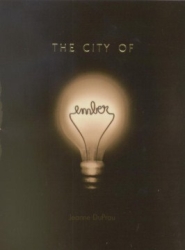
This book was super captivating as it was a search for truth and freedom. Throughout the book, we see the struggles of people in a dying city; the lights are running out, and the food is too. Through these problems, we see the attempts people make to survive, which lead to people stealing food and hiding it for themselves. Luckily two brave kids choose to find the truth and go on a journey to escape the city. When they finally find the light they realize their whole lives they were underground in the dark. A whole world was waiting for them at the top, but because no one was brave enough, they were stuck in their dying city. This book teaches us the importance of curiosity and the importance of hope; without these, people would be left to die in a dying city, never getting the chance to see the light.
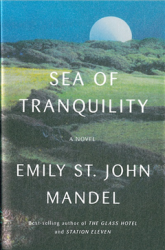
Science fiction often bogs itself down in the details of a potential future while forgetting the poetry that can come with the written word. It doesn't matter what scientific topic the book is handling if it's not entertaining to read. The best ones are a combination of speculative science, entertainment, and beautiful prose. I feel Sea of Tranquility meets these three criteria. The narrative is gripping, the framework thought-provoking, and the execution superb. I've never seen such a common sci-fi topic like this handled so well.
Time travel feels like it can be a crutch for a writer. It's a way to fill in details in a non-linear format that covers up any plot holes in a way that feels cheap. Jumping around in time can also make things confusing, as it isn't clear what era each section is set in. However, the way Emily St. John Mandel handles time travel in this book is probably one of the best I've seen. While following a linear timeline (somewhat akin to Cloud Atlas), the depth of time travel reveals itself with each jump into the future.
I think the reason I love how this book handles time travel is that each revisit of events adds layers of context that almost require an immediate second read-through of the entire book. Sure, the time travel explains away certain mysteries—but giving the reason behind those moments just elevates the story to higher levels. And throughout the whole thing, the descriptions, wording, and overall writing is just fantastic. Even if you don't like science fiction, this book stands out as a well-written piece of work that dives deeper into how humans can't ever know the full extent of a moment from a singular perspective.
The best time travel book I've ever read, I give Sea of Tranquility 5.0 stars out of 5.
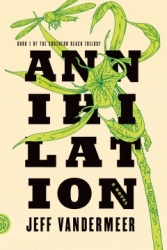
Having already watched the 2018 movie adaptation of Annihilation , I knew going into this book that it would be quite the trip. My expectations were mostly set on what was going to happen in this book, but not on how the author would convey these events. I was pleasantly surprised with something that felt just as disorienting. Told in the first-person perspective, Annihilation messes with the concept of an unreliable narrator in a way that I haven’t ever seen before. The real question is whether I understand anything now that I’ve seen the movie and read the book.
There’s a melancholy present in Annihilation that almost borders on nihilism. The way the main character seems to float through this world, carrying her trauma and relational scars around in an eerily monotonous and emotionless manner, is both unsettling and oddly comforting. Was this her attempt at obtaining closure? Did she want to find somewhere she truly belonged? Whatever the reason, she is propelled forward by forces outside her control, and she doesn’t resist any of the alien influence.
The prose in Annihilation is truly the star of the show here. Other writers might try to take a more scientific approach when dealing with aliens, but VanderMeer leans into the disorienting nature of Area X. I’ve been drunk a few times, but never high enough to hallucinate like this. Several times I had to stop and re-read a page to understand what was happening. Once I turned my mind off and let the words flow through me, I had a much more enjoyable time in this book. I don’t know if I’ll get through the rest of the trilogy, but this one was worth the read.
A trippy hallucination of a novel, I give Annihilation 4.0 stars out of 5.